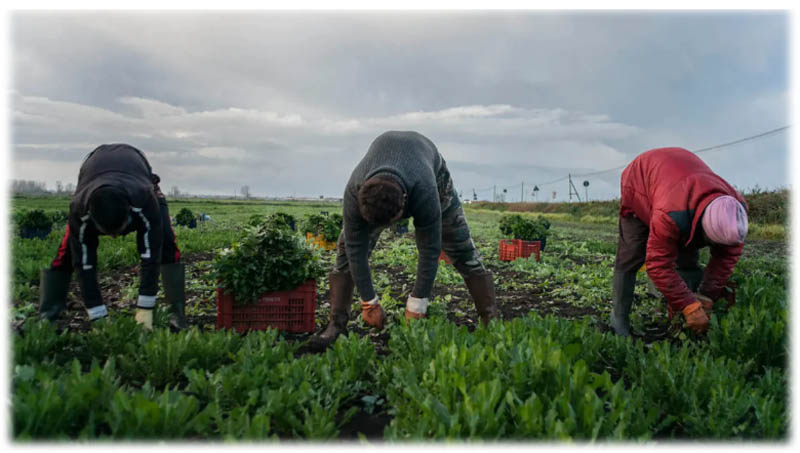 Sikh
Sikh
In the heartland of Italy, under the shadow of the Tyrrhenian Sea, is the Agro-Pontino, a 100-mile stretch of fertile plains.
It is an idyllic setting, abundant with verdant fields and panoramic landscapes, transformed into productive farmland from former marshland by Benito Mussolini’s directed mass migration in the early 20th century.
Today, the land bears witness to a darker narrative – the story of Italy’s Sikh slaves. An unexpected consequence of global economic interdependence and the unrelenting demand for cheap labor.
Balbir Singh, a migrant worker from Punjab, candidly shares his chilling tale. With the use of the Italian word ‘macello’, he tries to encapsulate the ordeal he endured – a term that roughly translates to ‘mess’. But ‘mess’ barely begins to illustrate the hellish six-year saga that Singh lived through in Latina, a rural region south of Rome and home to tens of thousands of Indian migrants.
“I was working 12-13 hours a day, including Sundays, with no holidays, no rest,” Singh confided. A wage of 100 to 150 euros a month, which roughly amounts to less than 50 cents an hour, was his only reward for the inhumane labor conditions. A stark contrast to the legal minimum wage of 10 euros an hour, illustrating the depth of exploitation these workers face.
Singh’s plight is not an isolated one. It is a grim fragment of a broader canvas painted with the abuse of migrant farmworkers, not only in Agro Pontino but across Italy. The situation is alarming enough to catch the attention of global institutions. As per the UN’s special rapporteur on contemporary forms of slavery, in 2018, there were over 400,000 agricultural workers in Italy at risk of exploitation, with nearly 100,000 likely subjected to “inhumane conditions”.
The population of the Agro-Pontino, once primarily Italian, is now significantly Indian. Conservative estimates suggest there are at least 11,000, though the number could be quadruple that figure. These economic migrants, primarily Sikhs from Punjab in northern India, journey thousands of miles with the promise of better lives for themselves and their families. They arrive to till the land, nurturing Italy’s agricultural industry, and send remittances back home, often making significant sacrifices for the financial well-being of their families.
However, the promised land too often turns into a realm of broken dreams. Unscrupulous agri-businesses and organized crime syndicates exploit these workers mercilessly. They labor under abysmal conditions, paid meager wages, often without formal employment documentation, effectively reducing them to a status reminiscent of servitude. Their dreams of a better life crumble under the weight of abuse and exploitation, trapped within a system seemingly designed to suppress and oppress them.
Their predicament is compounded by the lack of official documentation, rendering them invisible in the eyes of the law and society. This lack of visibility provides a protective cloak for their exploiters, who thrive in an environment where accountability is the exception rather than the norm.
The sprawling plains of the Agro-Pontino, now a critical hub of Italy’s food production, are nourished by the sweat and tears of these invisible victims. This region, transformed by Mussolini from marshland to fertile farmland, is ironically mired in a new form of fascism – one perpetrated by modern agri-businesses and organized crime networks.
Investigating deeper into this unsettling reality reveals a grim contrast to the bucolic charm of the Italian countryside. The dreams and aspirations of these economic migrants are tethered to the land they cultivate, toiling in the fields that feed Italy and much of Europe.
The story of Italy’s Sikh slaves is one of extreme courage and endurance in the face of a brutal and unyielding system. Their presence and significant contributions to Italy’s agricultural sector are undeniable, yet they remain unseen, unheard, and unacknowledged. In a globalized world increasingly conscious about fair trade, sustainable practices, and social equity, their plight cannot and should not be ignored. It’s time for the international community to act, shedding light on this hidden crisis, and working towards fair and humane labor practices in Italy and across the globe.
(Image and Text Credit: Khalsavox.com)
Support Our Journalism
We cannot do without you.. your contribution supports unbiased journalism
IBNS is not driven by any ism- not wokeism, not racism, not skewed secularism, not hyper right-wing or left liberal ideals, nor by any hardline religious beliefs or hyper nationalism. We want to serve you good old objective news, as they are. We do not judge or preach. We let people decide for themselves. We only try to present factual and well-sourced news.







